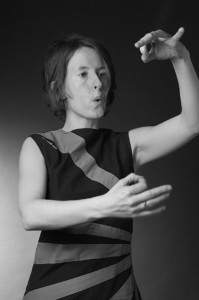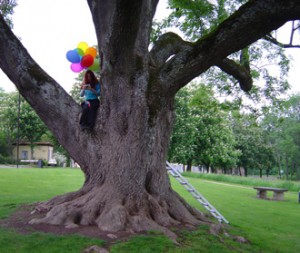Interview with Jennifer Walshe
In the second of a series of interviews by postgraduate students with eminent composers who are coming to visit us at Southampton Ben Jameson asks Jennifer Walshe some questions:
 Ben Jameson (BJ): Your work often draws upon fields outside of music, such as performance art, video, sculpture and fashion. What is it about music that made you want to be primarily a composer, as opposed to any of these other fields? Do you feel that the term composer accurately describes what you do?
Ben Jameson (BJ): Your work often draws upon fields outside of music, such as performance art, video, sculpture and fashion. What is it about music that made you want to be primarily a composer, as opposed to any of these other fields? Do you feel that the term composer accurately describes what you do?
Jennifer Walshe (JW): I’m a composer because I’m trained as a composer and I’m interested in writing for musicians making sound, as well as using their voices, moving etc. That’s the tradition I’m interested in. I’ve seen myself variously described as a composer, artist, conceptual artist, performance artist. I have a lot of friends who think it would be a lot easier if we could describe ourselves as artists who work with sound, and I did feel that way myself for a time, but I’m quite happy now to identify as a composer. It’s a loaded term, it’s something to hit against and question.
BJ: Even your more ‘traditional’ works for the concert hall often feature elements of performance art. Are there any composers who particularly inspired your interested in the theatrical elements of music?
JW: As a student, I was influenced by Meredith Monk, Kagel, Laurie Anderson, Diamanda Galas, Robert Ashley, Alvin Lucier. But probably equally important are writers and playwrights such as Beckett, Richard Foreman, Flann O’Brien, Thomas Bernhard, Ben Marcus. Choreographers like Pina Bausch and Meg Stuart also had a massive impact, because they’re working in tanztheater, also Lucky Pierre.
BJ: Have the theatrical elements in your work ever caused problems with performers who may not be so comfortable with such extra-musical elements?
JW: Of course there have been casualties along the way. But I’m very lucky to work with a lot of amazing performers who are very excited to do the things I ask them to do. There’s a lot of performers out there very excited to do actions, play strange instruments and objects, work with technology and stretch their abilities.
BJ: You are often commissioned to compose works that feature your own voice. How does being a composer-performer affect the way that you think about writing a piece?
JW: Being a performer affects every piece that I write, regardless of whether I’m in it, because I’m always thinking of what the actual experience of the performers is. Even if I write a piece for string quartet and know I’m not performing in it, I’m playing through the sounds on whatever string instruments I have to hand, experimenting with whatever physical actions I’m asking them to do, making demos of every aspect of the piece. I always go through every part of every piece I write and think “what is the experience of the performer to play this part?” I trained as a trumpeter and I have very precise pictures in my mind of what it is to play 2nd trumpet in Mahler 2, for example. So I try to look through my work and see what is like for the clarinetist in DORDÁN, for example. Where will their props go? Do they have time to put their instrument down if they need to switch to making physical actions? What pitches are they playing? Where’s the part with the most meat for them? How do the page turns work? Samuel Beckett used to say that he was three people when he wrote a play – the actor saying the lines, the audience watching the play, and the playwright writing the play. I think it’s really important for composers to be these three people when they’re writing a piece – performer, audience and composer.
BJ: I find your use of everyday objects in a musical/performance context particularly interesting. I recently saw a performance of Everything You Own Has Been Taken to a Depot Somewhere, which featured several examples of this, including a particularly striking section near the end of the piece, in which the clarinettist spent a long time playing a game on a mobile phone, seemingly oblivious to the more conventionally ‘musical’ sounds of the other performers. I was wondering whether the use of these types of objects has any particular significance or meaning for you, both in general, and in this particular piece?
JW: I was once trapped on a bus with a guy cycling through every possible ring tone on his phone – he went through the entire phone listening to every option, then making a shortlist and toggling through them, then reducing it to two possibilities and switching between them before finally fixing on his choice. The whole bus was in agony. It was superb, like an amazing performance art piece. He was completely oblivious. So when I’m writing in someone playing a game and trying to keep their attention on both the game and where they are in their part, I’m writing something I see people do every day. These objects have a meaning for me in that they’re part of everyday life. They’re part of who we are as people, they’re part of the soundscape we live in.
In Germany right now there’s a lot of debate about this concept of using everyday sounds or objects – this is termed “diesseitigkeit” which translates roughly as “this-worldliness” (as opposed to “other-worldliness”). I’m one of the composers who this term is sometimes applied to, as are my friends in the composer/performer collective stock11. But I think my fellow stockies would be comfortable with me saying that we’re all interested in these sounds not because we’re making a specific choice to associate with a certain aesthetic school – we’re interested in them because they’re our experience, they’re what we witness every day. And personally speaking, it would be a pretty poor showing not to be interested in this life, this experience.

BJ: Can you tell us anything about what you will be talking about in your presentation in the graduate seminar series here at Southampton?
JW: I’ll be talking about how I deal with the visual in my work, whether that be physical actions, theatre, images or video. I’ll also touch on alter egos and the pertinence of using tools from science and speculative fiction.
We are delighted that Jenny will speak at the Music Research Seminar Series on Tuesday 18th March at 3.15pm.
